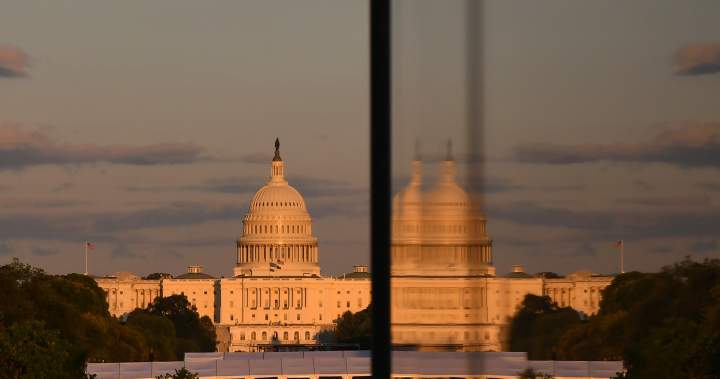The U.S. Senate passed legislation Wednesday that would nullify U.S. tariffs on Canada, just as U.S. President Donald Trump is engaged in trade talks in Asia as well as an increasingly bitter trade spat with U.S.’s northern neighbor that is one of its largest economic partners.

The 50-46 tally was one of a series of votes this week to terminate the national emergencies that Trump has used to impose tariffs.
On Thursday, four Republicans joined Democrats in a 51-47 vote to pass a resolution against Trump’s global “reciprocal” tariffs. That came after a 52-48 vote striking down steep tariffs on Brazil on Tuesday.
While the resolutions won’t ultimately take effect, they have proven to be an effective way for Democrats to expose cracks between the president’s trade policy and Republican senators who have traditionally supported free trade arguments.
Story continues below advertisement

2:08
Doug Ford calls out U.S. envoy for ‘unacceptable’ comments to Ontario trade rep
Sen. Tim Kaine of Virginia, the Democrat pushing the resolutions, said that higher prices caused by tariffs would force Republicans to break with Trump.
“It will become untenable for them to just close their eyes and say, ‘I’m signing up for whatever the president wants to do,’” Kaine told reporters.
The same four Republicans — Sens. Sens. Lisa Murkowski of Alaska, Susan Collins of Maine, Mitch McConnell of Kentucky and Rand Paul of Kentucky — voted with all Democrats to approve the resolutions applying to Canada, Brazil and the global tariffs, with Sen. Thom Tillis of North Carolina joining them on the Brazil resolution.
Kaine, joined by other Democrats and Paul, has forced the votes under a decades-old law that allows Congress to block a president’s emergency powers.
However, House Republicans have passed new rules that allow leaders to prevent such resolutions from getting a vote in that chamber, and Trump could veto the legislation even if it did clear Congress.
Story continues below advertisement

2:11
Carney ‘looking for someone to blame,’ Poilievre says after Trump ends trade talks over anti-tariff ad
Wednesday’s vote happened as Trump was in Asia to advance trade talks with partners there. The president has also been jousting with Canadian officials amid a delicate negotiation to reduce tariffs between the two countries.

Get daily National news
Get the day’s top news, political, economic, and current affairs headlines, delivered to your inbox once a day.
After a meeting with Chinese leader Xi Jinping in South Korea on Thursday, Trump said he would cut tariffs on the Asian economic giant and China would, in turn, purchase 25 million metric tons of U.S. soybeans annually for the next three years. The Republican president claimed his trade negotiations would secure “prosperity and security to millions of Americans.”
Paul, who has often broken with his Republican caucus on matters of taxes and spending, credited Trump for decreasing the tariffs on China but said the result is “still much higher than we’ve had.”
“It still will lead to increased prices,” he said.
Story continues below advertisement
Sen. Mike Crapo, the Republican chair of the Senate Committee on Finance, acknowledged in a floor speech that many “may be nervous about what comes next” as Trump remakes global trade. But he urged Congress to stay out of the way.
“Let’s truly get a balanced, fair playing field in trade,” Crapo added.
Yet there is increasing tension between GOP senators and the president over how soybean farmers have suffered from the trade war with China, as well as his administration’s plans to allow the purchase of more beef from Argentina.
Vice President JD Vance visited Republicans during a closed-door luncheon this week and also argued that they should steer clear of trade policy while the president negotiates deals. But Vance’s efforts appeared to have little impact on those determined to vote against the tariffs.
“Retaliatory tariffs on American products have turned agricultural income upside down for many of Kentucky’s nearly 70,000 family farms,” said Kentucky Sen. Mitch McConnell, the former longtime Republican Senate leader, in a statement.
“Bourbon has been caught in the crossfire from day one. And consumers are paying higher prices across the board as the true costs of trade barriers fall inevitably on them.”

3:22
‘Emotions don’t carry you very far’: Carney says after Trump pulls plug on trade talks
Trump said earlier this week he wanted to impose another 10 per cent tariff hike on imports of Canadian goods because of an anti-tariff television ad aired by the province of Ontario. The television ad used the words of former President Ronald Reagan to criticize U.S. tariffs.
Trending Now

$40M Lotto Max jackpot ticket sold in Ontario for 6th time this year

Hurricane Melissa: Jamaica wakes up to destruction as storm pummels Cuba
Story continues below advertisement
Canadian Prime Minister Mark Carney has been trying to engage with Trump to ease the import taxes that have hit Canada hard.
The U.S.-Canada economic relationship is one of the largest globally, totaling US$909.1 billion in 2024, according to the Office of the U.S. Trade Representative. More than three-quarters of Canadian exports go to the U.S., and nearly US$3.6 billion Canadian (US$2.7 billion U.S.) worth of goods and services cross the border daily.
Canada has also tried to turn to Asian trading partners amid the trade war.
Democrats argued the trade war was impacting a range of industries, from farmers to shipbuilders. They also said it made little sense to engage in a trade war with a close military ally.

1:37
Trump says he won’t meet Carney ‘for a while’ over anti-tariff ad
Trump has invoked a national emergency to impose the tariffs, saying that fentanyl and other illegal drugs are entering the country from Canada. So far this year, less than 1% of the total fentanyl seized by U.S. Customs and Border Protection, 66 pounds, was seized at the northern border.
Story continues below advertisement
Kaine argued in a floor speech that Trump’s trade policy was actually hinging on his personal feelings. He claimed that Trump had “such thin skin that an ad on television quoting Ronald Reagan” had prompted an end to the negotiations.
He asked, “How about that as a rationale for trade policy?”
GOP senators have mostly held the line this week behind the president.
More on Money
More videos
“I agree with my colleagues that tariffs should be more targeted to avoid harm to Americans,” Crapo said in a floor speech Thursday. Yet, he added that Trump’s negotiations “are bearing fruit” and praised his announcement that Beijing would allow the export of rare earth elements and start buying American soybeans again.
Republicans representing farm states were especially enthused by the announcement that China would be purchasing 25 million metric tons of soybeans annually, starting with 10 million metric tons for the rest of this year.
Sen. Roger Marshall, a Kansas Republican, said the deal with China “absolutely” justifies Trump’s use of tariff threats to negotiate trade policy with other nations. He called the announcement “huge news” for Kansas farmers, but also acknowledged that they would still probably need financial help as they deal with the strain of losing their biggest customer for soybeans and sorghum.
“It’s not like you can snap your finger and send over $15 billion worth of sorghum and soybeans together overnight,” he said.
Story continues below advertisement
China had been the largest purchaser of U.S. soybeans until this year. It purchased almost 27 million metric tons in 2024, so Trump’s negotiated deal only guarantees to return soybean exports to China to less than their previous level.
Sen. Kevin Cramer, a North Dakota Republican, called the purchase agreement a “start.”
Asked whether he agreed with Trump’s assessment that his meeting with Xi had been a runaway success, Cramer smiled and said the president “is nothing if not optimistic.”
—With additional files from Global News

